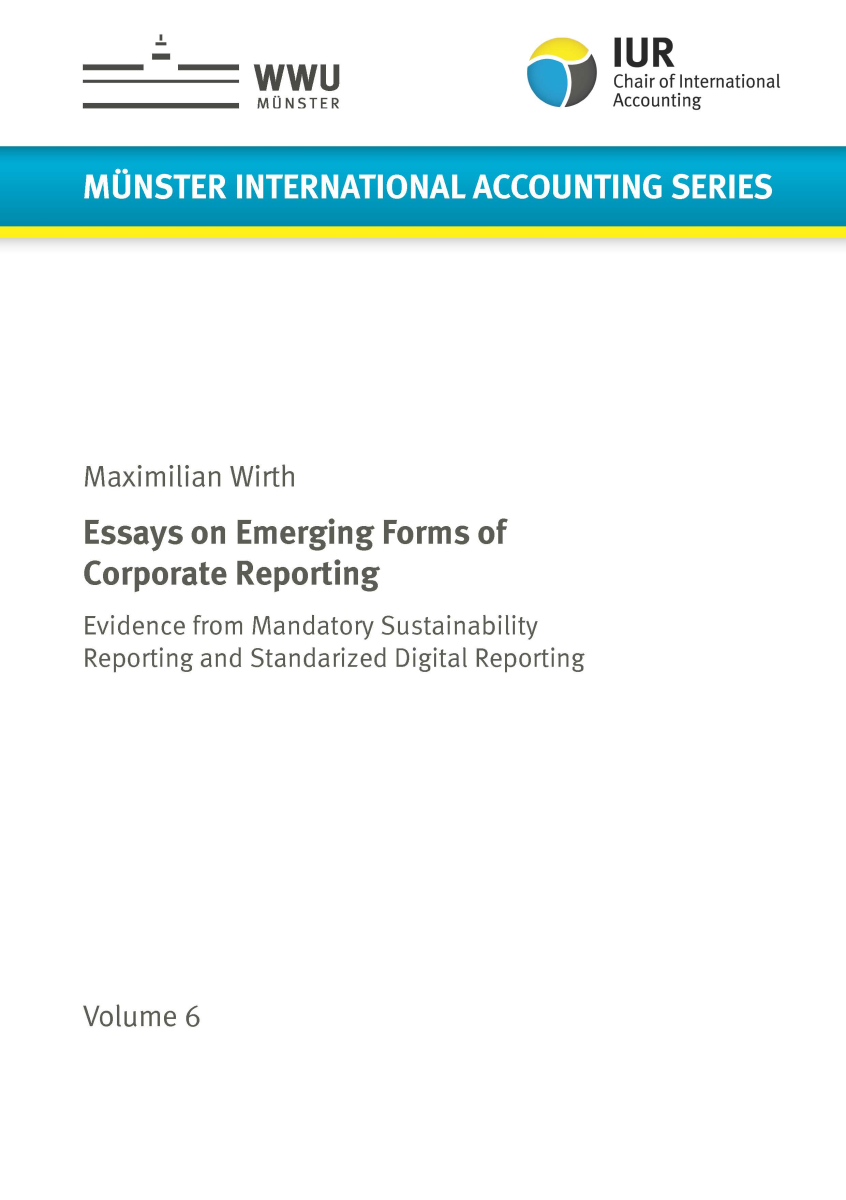Volume 6
Maximilian Wirth –Essays on Emerging Forms of Corporate Reporting - Evidence from Mandatory Sustainability Reporting and Standardized Digital Reporting
Bestellen (Link folgt)

Corporate reporting is currently undergoing a dynamic, far-reaching transformation. On the one hand, the introduction of mandatory sustainability reporting is discussed in many countries due to changing information needs of stakeholders and potential weaknesses of voluntary sustainability reporting. On the other hand, digitalization offers new technical possibilities, which bring global changes to how accounting information is prepared, disseminated, and analyzed. This thesis addresses these two developments in three papers and examines the role of corporate governance in mandatory sustainability reporting quality (study 1), the use of the eXtensible Business Reporting Language (XBRL) for mandatory sustainability reporting (study 2), and the harmonization of digital financial reporting in Europe (study 3).
The first study (“The Role of Corporate Governance in Mandatory Sustainability Reporting Quality”) analyzes to what extent voluntary corporate governance mechanisms help companies report sustainability information in high quality. To this end, the study assesses the quality of mandatory nonfinancial statements of German companies, a distinct form of mandatory sustainability reporting, using a disclosure index. The results of the study suggest that corporate governance plays an important role in ensuring a high quality of mandatory sustainability reporting. Hence, a positive effect on reporting quality is documented for companies having a sustainable remuneration of their executive board, having a high gender diversity at the supervisory board level, having established a CSR committee, being engaged in sustainability initiatives, and having their nonfinancial statements assured by external parties.
The second study (“The Effect of Using XBRL for Mandatory Sustainability Reporting on Information Asymmetry”) examines whether the use of the eXtensible Business Reporting Language (XBRL) for sustainability reporting can contribute to reducing information asymmetry between investors. The study provides evidence that information asymmetry between investors has increased significantly in the first years after the mandate. Further analyses attribute this effect to the underlying XBRL reporting taxonomy and show a stronger increase in information asymmetry for those companies whose information processing costs are high.
The third study (“Market Reactions to the Harmonization of Digital Financial Reporting in Europe – the Role of Pre-Adoption Experience in XBRL”) deals with the further development of digital financial reporting in Europe. It analyzes investor reactions to the development of a European Single Electronic Format (ESEF), which became mandatory for more than 5,300 European companies on or after January 1, 2020, respectively, 2021. The study finds an expected improvement in the information environment for companies with previous experience in digital reporting and companies located in countries with a high number of digital reporting projects and initiatives.
Taken together, the three individual studies provide information on how new forms of corporate reporting influence the information processing of individual groups of stakeholders. In this way, this thesis provides insights that can be beneficial for regulators, preparers, and the grown group of users of corporate reporting.


